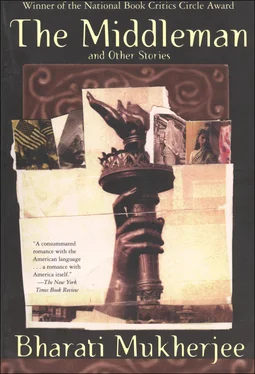In the car, Judith says, “You see what I’m up against? I’m sure they’re lovely people, but their stubbornness and ignorance are driving me crazy. They think signing a paper is signing their sons’ death warrants, don’t they?”
I am looking out the window. I want to say, In our culture, it is a parent’s duty to hope.
“Now Shaila, this next woman is a real mess. She cries day and night, and she refuses all medical help. We may have to—”
“—Let me out at the subway,” I say.
“I beg your pardon?” I can feel those blue eyes staring at me.
It would not be like her to disobey. She merely disapproves, and slows at a corner to let me out. Her voice is plaintive. “Is there anything I said? Anything I did?”
I could answer her suddenly in a dozen ways, but I choose not to. “Shaila? Let’s talk about it,” I hear, then slam the door.
A wife and mother begins her new life in a new country, and that life is cut short. Yet her husband tells her: Complete what we have started. We who stayed out of politics and came halfway around the world to avoid religious and political feuding have been the first in the New World to die from it. I no longer know what we started, nor how to complete it. I write letters to the editors of local papers and to members of Parliament. Now at least they admit it was a bomb. One MP answers back, with sympathy, but with a challenge. You want to make a difference? Work on a campaign. Work on mine. Politicize the Indian voter.
My husband’s old lawyer helps me set up a trust. Vikram was a saver and a careful investor. He had saved the boys’ boarding school and college fees. I sell the pink house at four times what we paid for it and take a small apartment downtown. I am looking for a charity to support.
We are deep in the Toronto winter, gray skies, icy pavements. I stay indoors, watching television. I have tried to assess my situation, how best to live my life, to complete what we began so many years ago. Kusum has written me from Hardwar that her life is now serene. She has seen Satish and has heard her daughter sing again. Kusum was on a pilgrimage, passing through a village when she heard a young girl’s voice, singing one of her daughter’s favorite bhajans. She followed the music through the squalor of a Himalayan village, to a hut where a young girl, an exact replica of her daughter, was fanning coals under the kitchen fire. When she appeared, the girl cried out, “Ma!” and ran away. What did I think of that?
I think I can only envy her.
Pam didn’t make it to California, but writes me from Vancouver. She works in a department store, giving make-up hints to Indian and Oriental girls. Dr. Ranganathan has given up his commute, given up his house and job, and accepted an academic position in Texas where no one knows his story and he has vowed not to tell it. He calls me now once a week.
I wait, I listen, and I pray, but Vikram has not returned to me. The voices and the shapes and the nights filled with visions ended abruptly several weeks ago.
I take it as a sign.
One rare, beautiful, sunny day last week, returning from a small errand on Yonge Street, I was walking through the park from the subway to my apartment. I live equidistant from the Ontario Houses of Parliament and the University of Toronto. The day was not cold, but something in the bare trees caught my attention. I looked up from the gravel, into the branches and the clear blue sky beyond. I thought I heard the rustling of larger forms, and I waited a moment for voices. Nothing.
“What?” I asked.
Then as I stood in the path looking north to Queen’s Park and west to the university, I heard the voices of my family one last time. Your time has come , they said. Go, be brave.
I do not know where this voyage I have begun will end. I do not know which direction I will take. I dropped the package on a park bench and started walking.












